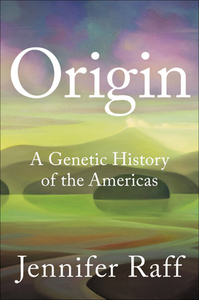Take a photo of a barcode or cover
challenging
hopeful
informative
inspiring
medium-paced
Raff does a really good job laying out the state of paleoanthropology as it stands today in regards to humans coming to the Americas. I think she goes into great detail about the different theories and the support and detractions for both. I think she does so to the detriment of accessibility but I don't mind. I might not have absorbed everything but I'm better for having read it. I also appreciate her sensitivity to native people and their histories. I hope it becomes the norm swiftly.
informative
inspiring
medium-paced
informative
reflective
slow-paced
informative
fast-paced
Mixed bag for me. Some parts really interesting, others didn't hold my attention very well.
The most mind-blowing new information I learned is about the "land bridge" between present-day Siberia and Alaska that the first inhabitants of the Americas crossed during the last ice age. I always pictured something fairly narrow, like the isthmus of Panama, but they now think "Beringia" was twice the size of Texas! It's all underwater now.
The most mind-blowing new information I learned is about the "land bridge" between present-day Siberia and Alaska that the first inhabitants of the Americas crossed during the last ice age. I always pictured something fairly narrow, like the isthmus of Panama, but they now think "Beringia" was twice the size of Texas! It's all underwater now.
One of the best books I've read in a long while.
Jennifer Raff is a great writer. Origin is interesting for its subject matter, but she makes paleogenetics riveting. Over the course of this book, she describes in detail how paleogeneticists uncover the history of ancient peoples, giving a critique of the problematic (and extraordinarily racist) history of the field and what has been done in recent years to heal the the entirely valid distrust between Native communities and researchers. She shows how ancient DNA is extracted and analyzed. She examines the archaeological data, context, dating methods, and virulent disagreements concerning "good" sites containing human evidence from the deep past. She provides a world-class primer on scientific research ethics and how to build trusting relationships among stakeholder communities. And she lays out the state of the science concerning how Native peoples moved from Siberia to places as far afield as Florida, Chile, and the Greater Antilles. (Extra points for describing the North American ice wall from the last glacier maximum as six times taller than the wall from Game of Thrones.)
This book is written for general readers, not specialists, and it's clear that Raff is involved in science education, because every chapter is accessible, perfectly structured, and crystal clear. Also, the further reading resources seem fantastic. I very much look forward to whatever Raff publishes next (and secretly wish she had time to teach other scientists how to write books, because this was a joy). Five stars.
ARC
Jennifer Raff is a great writer. Origin is interesting for its subject matter, but she makes paleogenetics riveting. Over the course of this book, she describes in detail how paleogeneticists uncover the history of ancient peoples, giving a critique of the problematic (and extraordinarily racist) history of the field and what has been done in recent years to heal the the entirely valid distrust between Native communities and researchers. She shows how ancient DNA is extracted and analyzed. She examines the archaeological data, context, dating methods, and virulent disagreements concerning "good" sites containing human evidence from the deep past. She provides a world-class primer on scientific research ethics and how to build trusting relationships among stakeholder communities. And she lays out the state of the science concerning how Native peoples moved from Siberia to places as far afield as Florida, Chile, and the Greater Antilles. (Extra points for describing the North American ice wall from the last glacier maximum as six times taller than the wall from Game of Thrones.)
This book is written for general readers, not specialists, and it's clear that Raff is involved in science education, because every chapter is accessible, perfectly structured, and crystal clear. Also, the further reading resources seem fantastic. I very much look forward to whatever Raff publishes next (and secretly wish she had time to teach other scientists how to write books, because this was a joy). Five stars.
ARC
This was fascinating and informative. Also way over my head in many places. It was a pretty good overview of the history and current status of the field. She also addressed a lot of ethical issues, which was definitely food for thought.
I expected evolutionary science/history based on title, description, etc. Instead, I sort of got essays on ethics in archaeology. While ALSO VERY IMPORTANT, trying to shove both into a relatively short book did a disservice to each, and it means there's barely any info on early history in a book advertised as being about early history.
A sometimes-quite-technical but fascinating overview of what we do and don't know about the peopling of the Americas, which is more complicated and less well understood than you might expect (and quite probably differs from what you learned in school). There's as much "classical archeology" in here as there is genetics, which I really liked.
hopeful
informative
fast-paced
Excellent science writing. Well explained, approachable, and engaging. Written with respect for the human element that is such a huge and easily forgotten part of this type of work.


